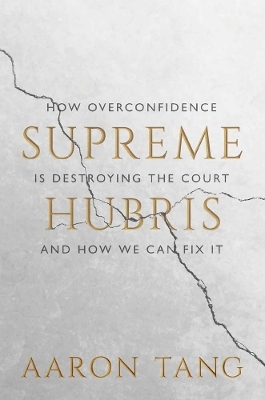
Supreme Hubris
How Overconfidence Is Destroying the Court—and How We Can Fix It
Seiten
2023
Yale University Press (Verlag)
978-0-300-26403-6 (ISBN)
Yale University Press (Verlag)
978-0-300-26403-6 (ISBN)
How to repair the dysfunction at the Supreme Court in a way that cuts across partisan ideologies
The Supreme Court, once the most respected institution in American government, is now routinely criticized for rendering decisions based on the individual justices’ partisan leanings rather than on a faithful reading of the law. For legal scholar Aaron Tang, however, partisanship is not the Court’s root problem. Overconfidence is.
Conservative and liberal justices alike have adopted a tone of uncompromising certainty in their ability to solve society’s problems with just the right lawyerly arguments. The result is a Court that lurches stridently from one case to the next, delegitimizing opposing views and undermining public confidence in itself.
To restore the Court’s legitimacy, Tang proposes a different approach to hard cases: one in which the Court acknowledges the arguments and interests on both sides and rules in the way that will do the least harm possible. Examining a surprising number of popular opinions where the Court has applied this approach—ranging from LGBTQ rights to immigration to juvenile justice—Tang shows how the least harm principle can provide a promising and legally grounded framework for the difficult cases that divide our nation.
The Supreme Court, once the most respected institution in American government, is now routinely criticized for rendering decisions based on the individual justices’ partisan leanings rather than on a faithful reading of the law. For legal scholar Aaron Tang, however, partisanship is not the Court’s root problem. Overconfidence is.
Conservative and liberal justices alike have adopted a tone of uncompromising certainty in their ability to solve society’s problems with just the right lawyerly arguments. The result is a Court that lurches stridently from one case to the next, delegitimizing opposing views and undermining public confidence in itself.
To restore the Court’s legitimacy, Tang proposes a different approach to hard cases: one in which the Court acknowledges the arguments and interests on both sides and rules in the way that will do the least harm possible. Examining a surprising number of popular opinions where the Court has applied this approach—ranging from LGBTQ rights to immigration to juvenile justice—Tang shows how the least harm principle can provide a promising and legally grounded framework for the difficult cases that divide our nation.
Aaron Tang is professor at the University of California, Davis, School of Law and a former law clerk to Supreme Court Justice Sonia Sotomayor. His writings have appeared in the New York Times, Washington Post, Los Angeles Times, and Slate.
| Erscheinungsdatum | 19.07.2023 |
|---|---|
| Zusatzinfo | 1 b-w illus. |
| Sprache | englisch |
| Maße | 140 x 216 mm |
| Themenwelt | Recht / Steuern ► Allgemeines / Lexika |
| Recht / Steuern ► EU / Internationales Recht | |
| Recht / Steuern ► Öffentliches Recht | |
| Sozialwissenschaften ► Politik / Verwaltung ► Staat / Verwaltung | |
| ISBN-10 | 0-300-26403-8 / 0300264038 |
| ISBN-13 | 978-0-300-26403-6 / 9780300264036 |
| Zustand | Neuware |
| Informationen gemäß Produktsicherheitsverordnung (GPSR) | |
| Haben Sie eine Frage zum Produkt? |
Mehr entdecken
aus dem Bereich
aus dem Bereich
Organisationen steuern, Strukturen schaffen, Prozesse gestalten
Buch | Softcover (2024)
Rehm Verlag
38,00 €


